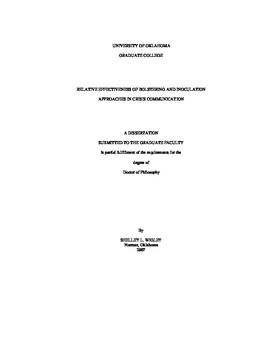| dc.description.abstract | The purpose of this study was to explore the effectiveness of communicating to the public before a crisis occurs. Previous research on crisis communication has employed primarily atheoretical approaches that focus on strategies to be used once a crisis occurs. As suggested by previous researchers (Wan & Pfau, 2004), inoculation, a strategy designed to reinforce the public's positive attitude toward an organization, may provide an alternative strategy to crisis management. The study utilized both affective and cognitive inoculation treatments, along with bolstering, corporate social responsibility, and control messages. Dependent variables included corporate reputation, attitude and purchase intention. The study also used a real-world crisis that impacted an actual company. Results indicated that both affective and cognitive inoculation, bolstering, and corporate social responsibility messages were equally effective in protecting a corporation's reputation following crisis; however, there was no support for attitude, and only participants in the CSR condition reported greater intentions to purchase the company's products following a crisis. The study also found no downside to inoculation when a crisis does not occur. In fact, inoculated participants rated the company involved in the crisis higher on all dependent variables including corporate reputation, attitude, and purchase intention than those participants in the control condition. The study also explored the role of affect in the counterarguing process. Previous researchers have met with minimal success when attempting to capture affect during the counterarguing process (Lee & Pfau, 1997). This study attempted to capture affect by employing a recognition check-off list, an alternative method for measuring the construct, which has been used successfully in past studies (Pfau et al., 2004; 2005). In addition this study was the first to categorize counterarguments as either affective or cognitive in nature. As expected, cognitive inoculation treatments produced more cognitive counterarguments while affective inoculation treatments produced more affective counterarguments. Surprisingly, the study also found that participants rated affective counterarguments significantly stronger than cognitive counterarguments. | en_US |
